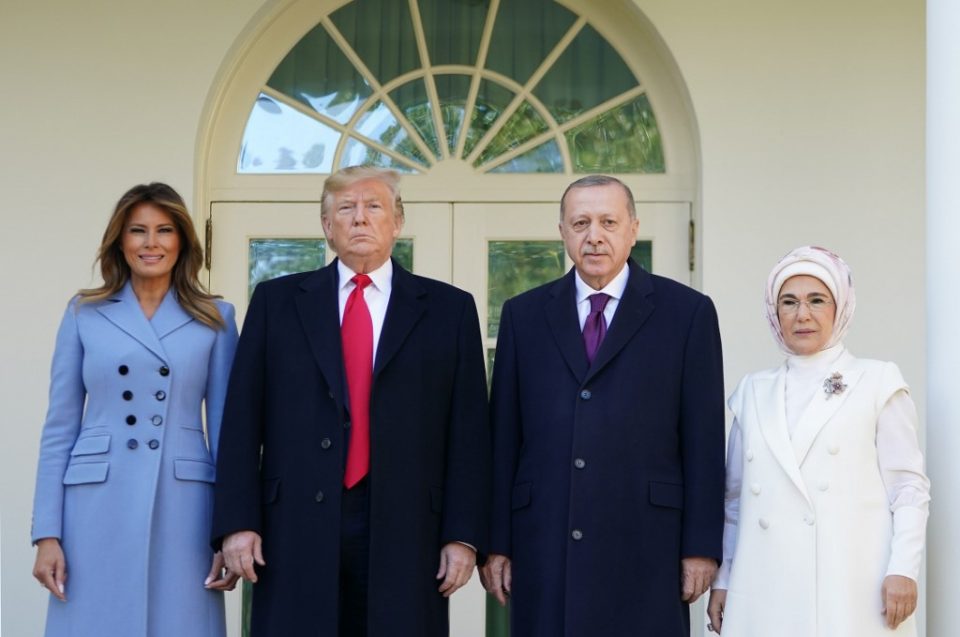
by Sebastian Smith
WASHINGTON, United States (AFP) — President Donald Trump on Wednesday sidestepped rows snaring US relations with fellow NATO member Turkey, instead of telling visiting President Recep Tayyip Erdogan that he is a “fan.”
On a day when Congress was holding its first nationally televised hearings in the impeachment probe against Trump, the US president spent several hours meeting at the White House with Erdogan and claimed to be paying no attention to his domestic crisis.
“I would much rather focus on peace in the Middle East,” he told a joint press conference with Erdogan, describing the impeachment as a “hoax” and a “joke.”
But Trump steered equally clear of the controversy over Turkey, which is rapidly becoming one of Washington’s most problematic partners in a tinderbox region.
Relations have been under severe strain following Erdogan’s ordering of an October offensive against US-allied Kurdish forces in northern Syria.
Trump ordered US troops stationed in the border area to withdraw ahead of the Turkish invasion while exhorting Erdogan in an extraordinarily undiplomatic letter to avoid too much bloodshed.
“Don’t be a tough guy. Don’t be a fool!” Trump wrote in the letter, which was reportedly thrown by Erdogan into the trash.
Even with the letter, Trump’s withdrawal of US soldiers effectively gave Turkey a green light to mount what appears to be an extended occupation of a large swath of Syria where ethnic-Kurds had held sway.
This outraged many in Congress, which saw the move as an abandonment of the Kurds, who died in large numbers while fighting alongside US forces against Islamic State jihadists in the area.
The reshuffling of forces in the region was also criticized in Washington as a boon for Russian ambitions.
“Given this situation, we believe that now is a particularly inappropriate time for President Erdogan to visit the United States, and we urge you to rescind this invitation,” a bipartisan group of legislators wrote to Trump last week in a letter made public Monday.
Trump was defiant over his close ties to Erdogan, saying: “We have been friends for a long time.”
And at the press conference, where openly friendly reporters from both countries were chosen to put softball questions, Trump doubled down.
“I’m a big fan of the president,” he said.
Russian missiles
There was no indication of major progress on any of the growing disputes between the two countries after the Trump-Erdogan get-together.
On top of the Syria mess, Turkey’s role in NATO is under question following Erdogan’s decision to buy the Russian S-400 anti-aircraft missile system.
Washington has excluded Turkey from the F-35 stealth warplane program over the purchase, creating even more tension in the troubled Western alliance. Erdogan has responded by suggesting he could instead buy Russian warplanes as well.
“Hopefully we will be able to resolve that situation,” Trump said at the press conference, without further explanation.
The US Congress has proven far less patient with Turkey.
Trump — who needs to maintain Republican loyalty to avoid conviction in the Senate if he as, as expected, impeached by the House of Representatives — wants to avoid antagonizing lawmakers further. He invited several Republican senators to the White House to meet with Erdogan.
The House showed its displeasure with Turkey in October by voting to recognize the mass destruction of the Armenian community in the Ottoman Empire as genocide.
Modern-day Turkey continues to deny the accusation of genocide, saying Armenians were merely among the many other victims of World War I. The vote infuriated Erdogan who said Wednesday that it cast a “deep shadow.”
Protesters were beaten up
There is tension to spare between the two countries even beyond the fate of the Syrian Kurds and the S-400s.
Washington is angry over the long-term detention of Turkish citizens working for US consulates, while Ankara continues to push hard for the extradition of the Islamic cleric Fethullah Gulen, whom Erdogan claims engineered a failed 2016 coup.
Another point of contention was the ugly scenes during Erdogan’s last Washington visit, in 2017, when his bodyguards beat up protesters outside the Turkish ambassador’s residence.
© Agence France-Presse
